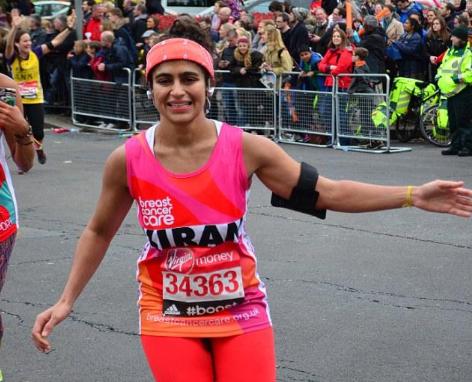Why We Need More Kiran Gandhis
Kiran Gandhi

I studied in one of the best schools in India, but as far as I can tell, I did not have a lesson on menstruation. Sure, I did learn about the menstrual cycle. I learnt about the effect of hormones, the approximately monthly cycle and the rupture of the uterine walls. What I was not taught at school was about menstruation itself. I was not taught of sanitary napkins, of tampons and cups, of period cramps. I was not taught of bloating, of how long and how heavy the flow can be. None of the basic, practical aspects surrounding menstruation was taught to me. I heard of tampons later in my teenage years, and menstrual cups much later. Considering that nearly half the people I know go through this process, I feel I was left in the dark by my school.
The narrative surrounding menstrual bleeding is one of unnecessary shame and secrecy. One of the top brands of sanitary napkins in India is called Whisper, alluding to the idea that periods are only meant to be whispered about. They should not be talked of openly or in public. Advertisements that portray periods usually show women being shy about it rather than being in discomfort. Even today, sanitary napkins are sold in black bags across India. Why? What is the need for the secrecy and shaming?
It is precisely to talk about this that we need more bravehearts like Kiran Gandhi. Kiran Gandhi ran the London marathon without any sanitary napkins. On the eve of the marathon, she discovered that her periods had started. She had two options – to run the marathon with an uncomfortable wad of cotton between her legs, or to run free, and not give a damn about her bleeding. Bravely, she chose the latter, setting social media ablaze in admiration and criticism.
When we do not talk openly about menstruation, we are depriving half of the society of a life with dignity. Across India, only 12% of the girls and women have access to sanitary protection. 70% of women in India cannot afford to buy sanitary napkins, resulting in high rates of Reproductive Tract Infections. Lack of understanding and awareness is keeping girls out of schools. Fearing being bullied or stigmatized for soiling their clothes, girls would rather be at home than go to school. By keeping silent about menstruation, we fail to address these glaring inequalities. We stop the search for low priced and healthy sanitary protection. Our silence is costing the women and girls their health, their education, and their right to a better life.
Yes women menstruate. Yes, it is painful and uncomfortable. Even today, as a 25 year old man, women whisper to me that they are on their periods. Often, there is no mention of it. It gets packaged in nicer words – ‘chums’, ‘time of the month’, ‘cramps’. Considering that we all know that it happens, considering that it is a basic biological process, you have to wonder why there is a need to go about it so silently. You have to wonder why it is only whispered. You have to wonder why even today, in India, sanitary napkins are sold in black bags, an open secret that everyone knows but no one talks about.
We need more Kiran Gandhis. We need more women who bravely announce to the world that they menstruate. We need fewer advertisements that show coy women searching for sanitary napkins and that use blue ink to denote blood flow. We need to tell our schools and colleges that boys and men too must be a part of the sex education classes so we understand rather than bully and stigmatize. We need to own our bodies as human beings. We need to stop being ashamed of a process so vital to our being.
(Varun Warrier is a PhD student at the University of Cambridge).



